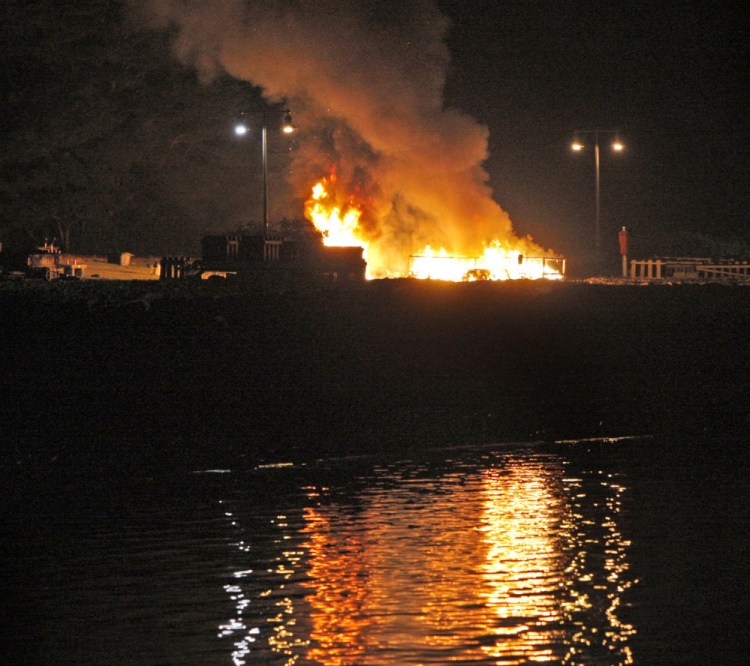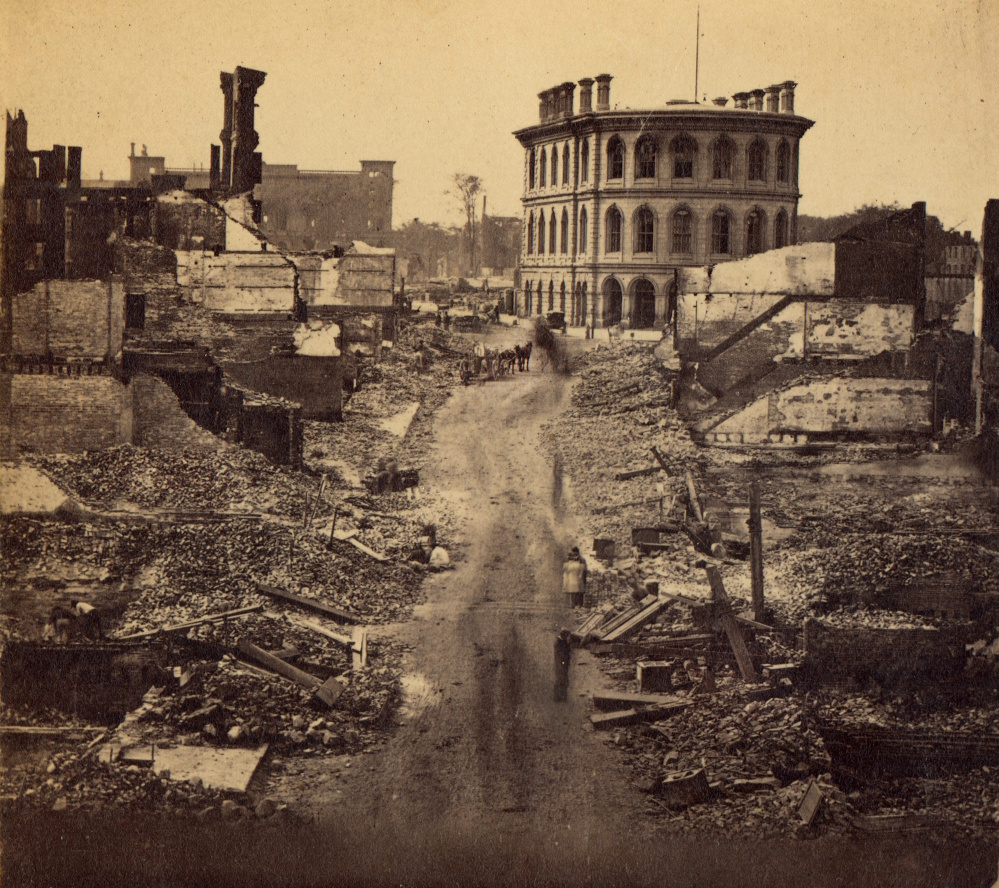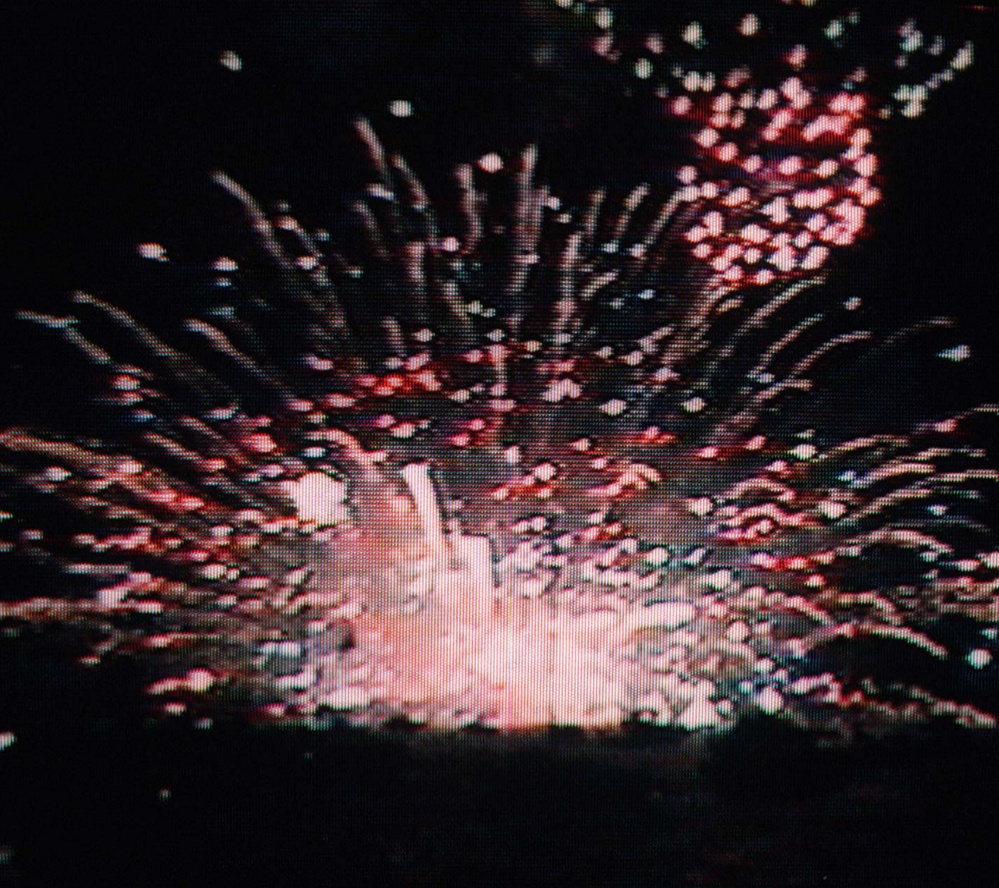Portland has a long, troubled history with fireworks on the Fourth of July.
Those troubles go back to The Great Fire of 1866, a disaster that struck 150 years ago Monday. But they also include several commercial firework explosions that have marred Independence Day celebrations in the past 20 years.
Portland’s annual fireworks display will go on as usual Monday, and more than 50,000 people are expected to enjoy the lights and sounds over the Eastern Promenade. But given Portland’s history, it’s no surprise that the city is one of 41 communities in Maine that continues to ban consumer fireworks.
With warm weather coming on the heels of a dry spring – much like the conditions that existed during the 1866 fire – the Portland Fire Department held a news conference Thursday to highlight the potential fire danger. The sale and use of fireworks is prohibited in Portland, and the city may prohibit all outdoor recreational fires if winds exceed 15 mph or if the fire danger goes from moderate to high.
“We love the nice weather, but it is something we have to take into consideration,” said Assistant Fire Chief Keith Gautreau, who noted that charcoal and gas grilling can only be done on the ground and not on balconies. “We’re a densely populated city so the danger is a lot higher for us, opposed to up north somewhere.”
When it comes to fireworks, other communities in Maine have had similar experiences.
In 2010, two professional firework technicians were injured in unrelated incidents in Augusta and Belgrade.
In 1993, a pyrotechnician was killed when a mortar exploded prematurely and set off other explosions during a show fired from a barge in Bar Harbor.
But Portland’s troubles with fireworks go much deeper.
ACCIDENTAL FIRES, BLASTS, INJURIES
The most prominent example of that history was The Great Fire of 1866, which began that July Fourth with children lighting firecrackers on the waterfront. The fire, which began in a pile of wood shavings, quickly spread to a Commercial Street boat shed and was eventually pushed by a strong southwesterly wind across a mile-long swath of the city, destroying one-third of the downtown area and displacing 10,000 residents. At the time, it was the most destructive fire in the nation’s history, largely because of drought conditions, a lack of water and strong winds.
The Great Fire led to a debate on the legality of fireworks in Portland that continues today.
But it isn’t the only time Portland had trouble with fireworks.
In 1997, a defective shell exploded only a few feet off the ground on July Fourth, igniting dozens of shells that were waiting to be fired. That set off a chain reaction that sent pyrotechnicians scrambling for cover and left many spectators wondering why the show had ended early. Three workers were injured and at least 222 rockets that had not been set off during the celebration were detonated after midnight by firefighters.
In 2010, a piece of burning ash from the city’s July Fourth celebration started a fire on the Eastern Prom, detonating a stash of fireworks being stored in a container shortly after the grand finale. Many in the crowd wondered whether the display was an encore presentation, but realized it was accidental when fire crews began to extinguish the flames.
In 2012, a mortar exploded prematurely during the city’s Independence Day fireworks display and severely injured a technician working for the private company hired to put on the display.
The fireworks were being shot from a barge anchored off the Eastern Promenade, as a thunder and lightning storm bore down on the city, when one of the fireworks detonated prematurely, just above the barge. The worker’s injuries included a broken humerus, clavicle and scapula, broken neck vertebrae and ribs and a collapsed lung.
That history, starting with the Great Fire, has fueled a long-running debate about the legality of fireworks in Maine’s largest city.
At the time of the historic fire, consumer fireworks were legal and sold in toy stores. One firefighter trying to contain the flames spreading across the city recalled dodging a volley of missiles from fireworks that ignited when the Charles Day Toy Store went up in flames.
NOT WILLING TO TAKE THE RISK
The conflagration soured the city on such celebrations.
Immediately after the 1866 fire, a group of men dumped the city’s stash of July Fourth fireworks – anticipated to be the largest display ever seen in Maine – into the Fore River in disgust, said Herb Adams, a local historian.
The fire department formally requested that the Portland Board of Aldermen, which today is known as the City Council, ban consumer fireworks.
“As it is generally believed that the July fire was caused by firecrackers, and as their use is always attended with the risk of conflagrations, I would recommend the passage of an ordinance, making it penal to keep or sell firecrackers,” fire Chief Engineer Spencer Rodgers wrote in his annual report to the board.
Portland would eventually ban the sale and use of consumer fireworks, but it’s not clear when. A copy of city ordinances from 1868 shows a statute prohibiting the sale or distribution of “crackers, squibs, rockets or other fireworks” without a license, although it’s not clear if people who used fireworks were subject to prosecution.
The Maine Legislature debated whether to ban consumer fireworks statewide in 1949, 83 years after Portland’s fire. At the time, a lawmaker from Auburn pointed out that Portland, South Portland, Lewiston, Auburn, Augusta, Waterville, Bangor, Rumford, Calais and Caribou had banned consumer fireworks.
Sen. Ralph Leavitt, of Cumberland County, said Portland’s ban was useless because neighboring towns continued to sell fireworks. He equated consumer fireworks to “high explosives,” like those fired at the Battle of Bunker Hill.
“The cannon they had back in those days couldn’t have made as much noise as these salutes they have now,” Leavitt said. “When they fire one over two miles from my home, I can hear it. I live in a quiet little village, and you can hear that bang, bang, bang all day long for days and days.”
Sen. Frederick Allen, also of Cumberland County, advocated for the ban as a way to protect veterans. “There are 90,000 Maine veterans, and I wonder about the veterans of both wars who have come back from those wars shell-shocked in one way or another,” he said.
The Legislature enacted a statewide prohibition on consumer fireworks in 1949 by a 22-9 vote in the Senate and a 106-14 vote in the House, citing concerns about safety and noise. That ban remained in effect until 2011, when the legislators passed a law allowing the sale and use of some consumer fireworks.
Shortly before the state law took effect in Jan. 1, 2012, the Portland City Council enacted an ordinance to continue the prohibition against the sale and use of consumer fireworks within the city. One city councilor noted the destruction caused in 1866 as a reason to support the measure.
Send questions/comments to the editors.





